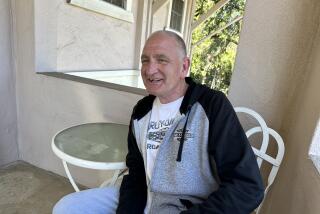Change of Heart : Ex-Convict Turns Life Around, Wins Prestigious CSU Award
- Share via
During the 20 years that Patrick Blevins abused drugs, survived overdoses that should have killed him and spent a total of 13-plus years in prison for drug-related crimes, a college degree was the furthest thing from his mind.
Drug-free and sober since 1983, the 38-year-old Blevins, who has flecks of gray in his hair and beard, is one final exam away from a degree in social work from San Diego State University. He is also a recent recipient of a prestigious trustee’s award from the California State University system.
The $2,500 Evelyn D. Armer Memorial Scholarship is given annually to no more than three of the 360,000 students enrolled in the CSU system, said Anne Ambrose, a spokeswoman for the system’s chancellor’s office.
The award recognized Blevins’ personal and academic achievements, and his commitment to community service for working to warn others about the dangers of drug and alcohol abuse.
Blevins, an honor student who brushes off any mention of his success, sees his work as a way to make amends for his past.
“I should have been dead, but I was saved to make a difference in other people’s lives,” said Blevins, who lives in San Diego. “That’s part of my mission, I have to give back to society what I took in the crimes and everything I did.”
He was one of nine students honored recently with a Quest for the Best Award from SDSU for his community service, academic and personal achievements.
In addition to his course load, Blevins works as a peer educator in Student-to-Student, a drug and alcohol prevention program at SDSU that he helped develop.
Along with 35 other peer educators, Blevins stakes out spots on campus and gives presentations to students about responsible drinking, and the dangers of drugs and other addictive behaviors.
“Patrick is very effective because he really walks his talk,” said Louise Stanger, project coordinator for the group. “He really believes that the only reason he’s been spared is to serve as a role model for other people who have a problem with alcohol and drugs.”
Blevins, who starts graduate studies in social work at SDSU in two weeks, has plans for a career as a clinical social worker helping families affected by chemical dependency, a job Blevins said is perfect for him.
“I’m in the one field where my past is my asset,” he said.
But the road to recovery for Blevins was not an easy one. The collage of tattoos covering both arms and some of his chest is a constant reminder of the time he spent in jail because of his drug habit.
At 12, Blevins first experimented with drugs and alcohol. As he landed in and out of jail, Blevins said, he got to a level of addiction where he had to inject a mixture of heroin, cocaine and speed to get a good high.
“The needle was my worst addiction,” Blevins said.
In 1983, he was arrested and thrown in jail, where he went through drug withdrawal. Here, Blevins had what he calls a “spiritual experience” that convinced him to get off the drugs.
“I saw mental images of all the times I should have been dead, and there were a bunch of them, like car accidents and eight overdoses,” Blevins said. He said he realized then, “if I don’t stop now, I will die.”
After three drug-free years in prison, Blevins was released in September, 1986, and volunteered to be a counselor at the Scripps Memorial Hospital McDonald Center for Alcoholism and Drug Addiction Treatment.
“The best counselors are those who have been there,” said Fran Lambert, who at the time worked at the McDonald Center and gave Blevins a chance at counseling.
About the same time, Blevins got himself into a nonprofit recovery program called SPAN, which gives addicts a chance to take classes at SDSU and helps them take the first step toward becoming counselors, said Steve Schaefer, a clinical social worker with the program.
“He was picked by his class (1987-88) as the best SPAN student, and he has never looked back,” Schaefer said. “He is kind of an amazing story.”
Finishing SPAN was the confidence boost that Blevins needed to stay in school and get the degree to become a social worker.
“When I started SPAN, I didn’t think I could finish it,” Blevins said. “I never finished anything, the only thing I ever finished was my time” in jail.
Blevins has just been named program coordinator for SPAN. He will recruit and screen new applicants, work as the group’s contact to SDSU, and counsel students, Schaefer said.
A single father with a 10-year-old son, Christopher, Blevins is engaged to be married and enjoys his new lease on life.
But he never takes his recovery from drug addiction for granted and still attends up to seven support meetings a week.
“I have learned how to live, how to have compassion, how to care and how to love,” he said. “It’s a complete turnaround.”
More to Read
Sign up for Essential California
The most important California stories and recommendations in your inbox every morning.
You may occasionally receive promotional content from the Los Angeles Times.













